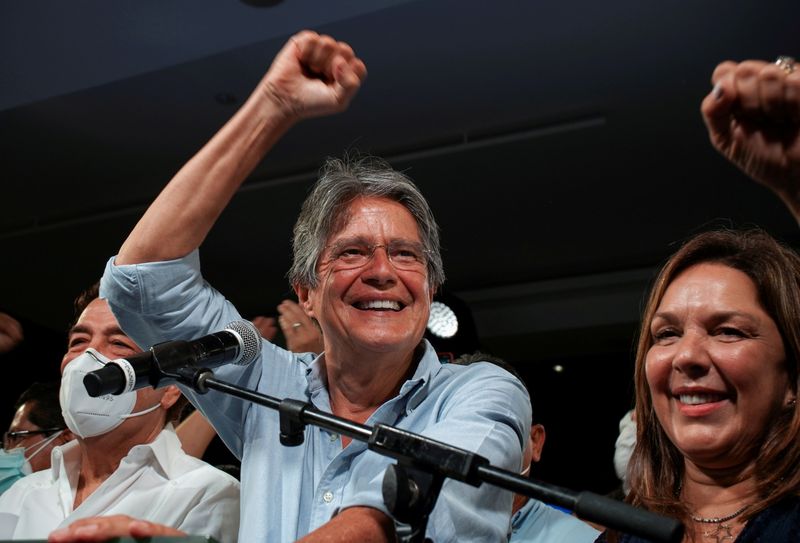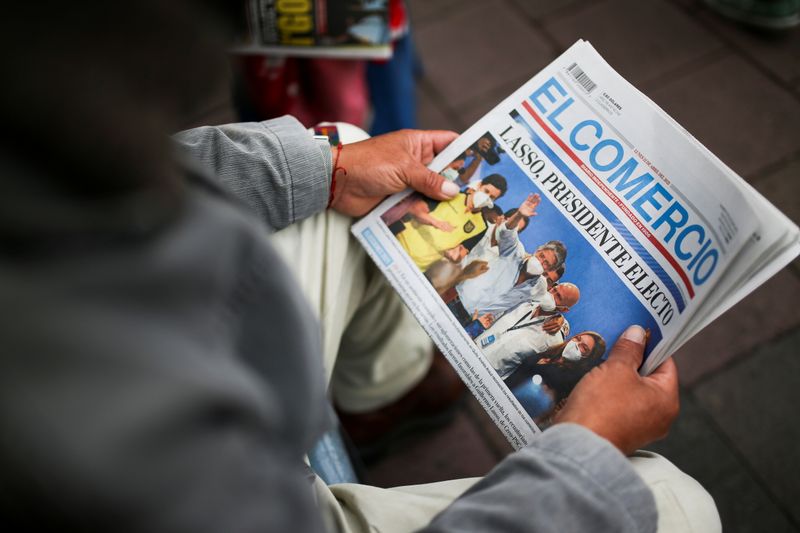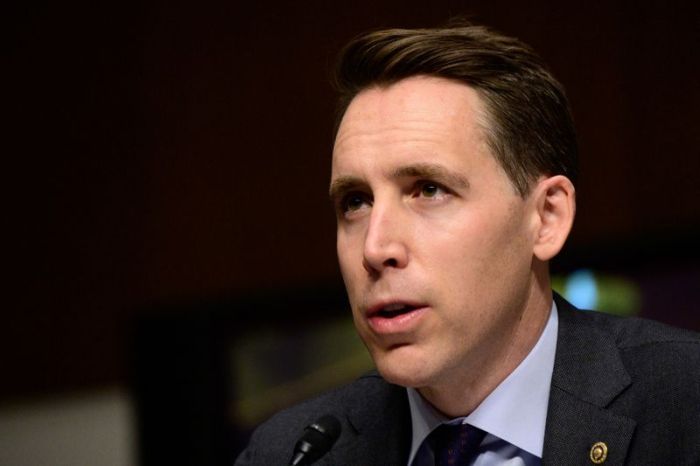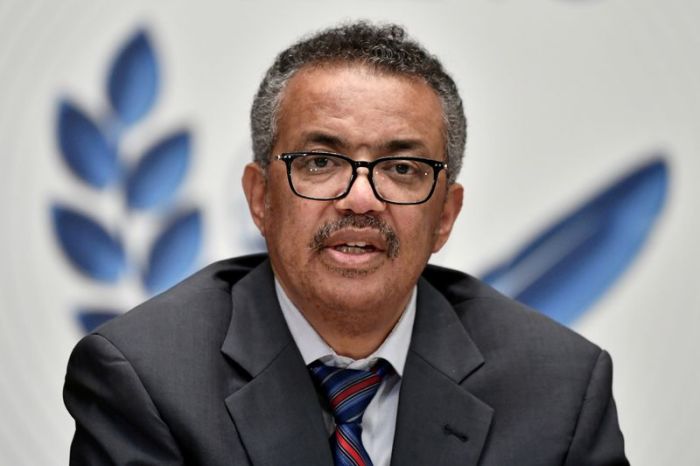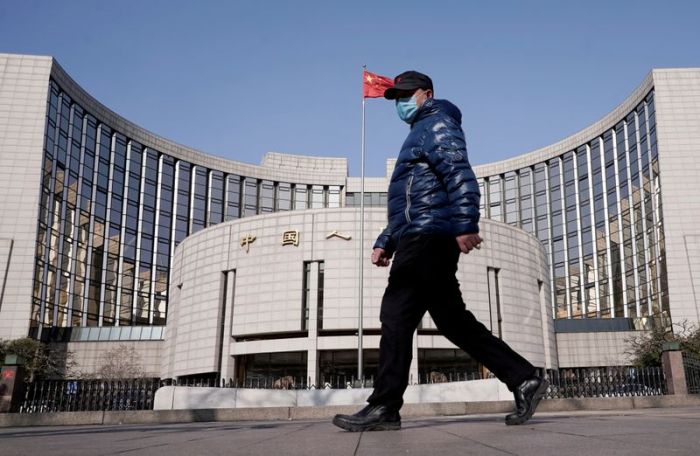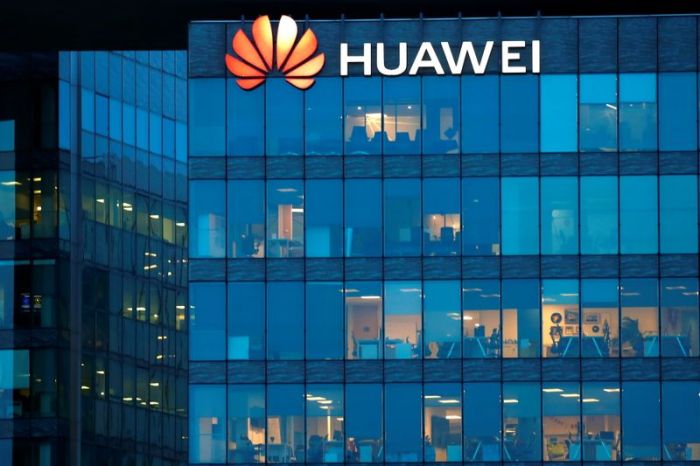By Alexandra Valencia and Brian Ellsworth
QUITO (Reuters) -Guillermo Lasso, who unexpectedly won Ecuador’s presidency on promises to revive an economy battered by the coronavirus, pledged on Monday to eliminate the fiscal deficit and to revamp oil deals.
Lasso, a banker, took 52% of the vote in the runoff following a campaign that pitted his free market economics against economist Andres Arauz’s pledges of a return to socialist largesse. Lasso’s victory was likely helped by a ballot spoiling campaign that left one in six ballots void.
Markets welcomed the news following months of concerns that Arauz’s social spending plans would upset the government’s delicate finances. Ecuadorean bonds rallied on Monday morning, with its July 2035 notes hitting their highest level since September, according to traders.
The International Monetary Fund (IMF) had recommended raising value-added tax as part of its $6.5 billion rescue package for the Andean country. But Lasso ruled that out on Monday, although he said he still planned to eliminate the fiscal deficit within four years.
“We are not going to raise taxes, we will not raise VAT,” Lasso told reporters. “We must be ambitious and achieve a zero deficit in four years of government. We will not depend on debt.”
The 65-year-old Lasso, who takes office on May 24, will have to find ways to kick-start a stalled economy while using the same pro-market playbook as President Lenin Moreno, who shored up government finances but struggled to create jobs and did not seek re-election.
Lasso said he would also propose new risk-sharing contracts with private companies in the country’s key oil sector in order to boost crude production, though he said he would respect all contracts with companies that were currently operating.
He also told reporters he was wary of oil drilling in the Yasuni national park in Ecuador’s Amazon region, and said he supported an audit to determine the costs of environmental remediation to “determine if extraction from those oil wells is really profitable.”
FREE-TRADE AGREEMENTS
Lasso’s third campaign for the presidency centered on bringing in foreign investment to create jobs and on expanding investments in the agricultural sector. On Monday, he pledged to pursue free trade agreements with several countries, including the United States and China, to attract investment.
“I hope he keeps his promise of creating jobs, because seven in 10 Ecuadoreans want formal employment,” said Juan Pablo Hidalgo, 33, a neighborhood activist in Guayaquil, Ecuador’s largest city. “It’s a moment in which we should all be united.”
Arauz, in contrast to his combative style on the campaign trail, on Sunday graciously accepted defeat.
But on Monday morning he called for an end to “political persecution,” a reference to the in absentia conviction of his mentor, former President Rafael Correa, on charges he accepted bribes in exchange for public contracts.
“We will not persecute anyone,” Lasso told reporters, adding that he would let the justice system operate independently.
Lasso will also face a significant challenge from Yaku Perez, an indigenous leader who nearly made it into the presidential runoff vote on an environmental platform that included a proposal to ban industrial mining.
Perez led a ballot-spoiling campaign in Sunday’s election that led to a spike in null votes and may have helped Lasso’s unexpected victory.
Perez’s Pachakutik party will be the second-largest in congress and could be a significant obstacle to Lasso’s economic development plans.
Any economic rebound will rest on a restructuring of the country’s stalled COVID-19 vaccination campaign, which has been plagued by nepotism allegations and a revolving door of health ministers who have resigned or been sacked.
“We hope that he leads the country in a correct way, that money is well invested,” said Katerina Ramos, 19, a student in Guayaquil.
(Reporting by Alexandra Valencia in Quito and Brian Ellsworth in Caracas; additional reporting by Yury Garcia in Guayaquil and Luc Cohen in Caracas; Editing by Howard Goller and Rosalba O’Brien)

